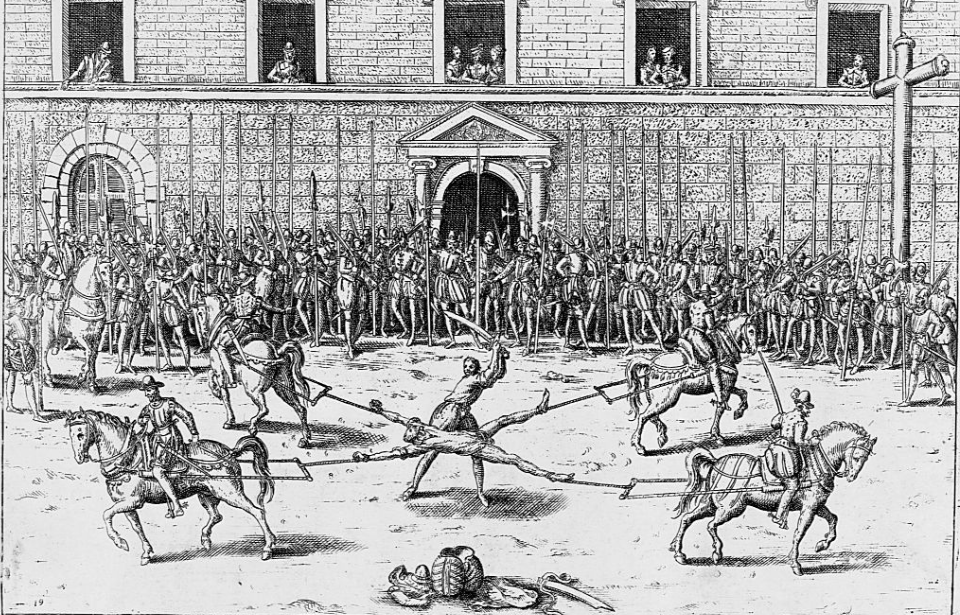Jack Ketch: The Infamous Executioner Who Botched His Way Into History
Discover the chilling legacy of Jack Ketch, one of England’s most infamous executioners, whose botched beheadings and incompetence left a bloody mark on history.
The name Jack Ketch has become synonymous with brutality and incompetence in the realm of public executions. In 17th-century England, Ketch held the gruesome role of executioner at a time when public beheadings were a form of both justice and entertainment. But while many executioners were respected for their precision, Jack Ketch’s legacy is far darker. His infamous mistakes left his victims suffering and cemented his place in history as one of the worst executioners of all time.
The Rise of Jack Ketch: From Nobody to Executioner
Jack Ketch‘s early life is shrouded in mystery. Very little is known about his upbringing, but by 1663, he emerged as an executioner in England. Historically, executioners were not noble figures but often criminals or people from the lower rungs of society who took the job out of necessity.
Jack Ketch’s rise to prominence, however, didn’t come from being particularly skilled at his profession. Instead, it was his shocking ineptitude that made him infamous.
Table: Jack Ketch’s Biography
| Name | Jack Ketch |
|---|---|
| Birth | Unknown (circa mid-17th century) |
| Occupation | Executioner in 17th-century England |
| Famous for | Botched executions of notable figures |
| Died | November 1686, London, England |
Infamous Executions: Ketch’s Bloody Legacy
If Ketch had simply executed his duties with precision, his name may have faded into obscurity. Instead, his career was marked by horrific bungles that shocked the public and cemented his reputation as the most hated man in England. The botched executions of Lord William Russell and the Duke of Monmouth are two of his most infamous blunders.
The Execution of Lord William Russell
One of Jack Ketch’s early public disasters came during the execution of Lord William Russell in 1683. Russell, convicted of treason for his involvement in the Rye House Plot, was sentenced to be beheaded. In those times, beheading was considered an honorable form of execution, reserved for the upper class. A swift, clean cut was expected, but that was not what Russell received.
Ketch’s inexperience or cruelty showed when he fumbled the beheading. It took multiple blows to sever Russell’s head, a botched act that caused public outrage. Pamphlets were distributed condemning Ketch’s cruelty, and his reputation as an incompetent executioner began to spread.
“He gave him three strokes, and then threw down the axe, swearing the head would not come off.” — Contemporary account of Lord Russell’s execution.
The Botched Execution of the Duke of Monmouth

Perhaps the most notorious moment in Ketch’s career came in 1685, during the execution of James Scott, the Duke of Monmouth, after his failed rebellion against King James II. The Duke was a beloved figure by many, and the public was eager to see him receive a swift, merciful death. Jack Ketch, however, had other plans.
In what is considered one of the worst executions in British history, Ketch failed to sever Monmouth’s head cleanly. It took him at least five strokes before he finally resorted to using a knife to finish the job. The public outrage following this event was immediate and intense. Ketch’s cruelty and incompetence were widely condemned in satirical pamphlets, making him the subject of public scorn.
The Duke of Monmouth’s execution remains one of the most infamous examples of executioner failure, and it severely tarnished Ketch’s reputation, to the point where his name became synonymous with botched executions.
The Impact of Jack Ketch on Public Perception of Executioners
Before Jack Ketch, executioners were feared but often respected for their precision and ability to perform the grim task efficiently. However, after Ketch’s public failures, the profession took on a new level of infamy. His name became a byword for incompetence and cruelty, and the public’s fear of the executioner turned into outright contempt.
“Ketch became a figure of scorn, mocked in the press and by the public. His name became associated with brutal incompetence.” — Wikipedia
The title of “Jack Ketch” was used in satirical literature, political cartoons, and songs to depict bumbling executioners in a comical, yet terrifying light. Executioners, once viewed as necessary parts of the justice system, were now painted as sadistic and unreliable.
The Legacy of Jack Ketch: Executioner Turned Legend
While Jack Ketch may have been incompetent in life, his legacy as an executioner has outlived him. The public’s disdain for his cruel methods led to a shift in the way executioners were perceived, and in the methods of capital punishment in the centuries that followed. His name became legendary, used to personify death and cruelty in literature, songs, and folklore.
The Evolution of Execution Methods After Ketch
The public outrage generated by Ketch’s incompetence may have contributed to a broader conversation about the need for more humane forms of execution. Over the next century, beheading became less common in England, and the guillotine was introduced in France as a faster, more efficient method of execution.
While Ketch wasn’t directly responsible for these changes, his bloody failures certainly influenced how society viewed executioners and the execution process.
Jack Ketch in Popular Culture
Jack Ketch’s legend has continued to evolve, especially in popular culture. His name appears in numerous works of fiction, often representing the personification of death or cruelty. He has been referenced in books, plays, and songs as a symbol of evil or incompetence.
- In literature: Ketch’s name is often used to describe cruel executioners.
- In folklore: The term “Jack Ketch” became a euphemism for death, appearing in numerous British ballads and tales.
His influence can still be seen today in references to cruel or inhumane forms of capital punishment, as well as in cultural depictions of the grim reaper.
The Executioner’s Lasting Impact on British History

Jack Ketch is more than a historical footnote. His notorious bungling of executions has ensured his place in the dark annals of British justice. His failures exposed the flaws in the justice system of the time, where even the most privileged individuals could meet a grisly, undignified end at the hands of an incompetent executioner.
Ketch’s legacy reminds us that the administration of justice is not only about punishment but also about the dignity of the condemned. His lasting infamy has ensured that his name will be forever associated with brutality and incompetence.
FAQ
- What made Jack Ketch infamous? Jack Ketch is infamous for his botched executions, particularly those of Lord William Russell and the Duke of Monmouth, which caused public outrage.
- How did Jack Ketch affect the role of executioners? Ketch’s failures tarnished the image of executioners, making them symbols of cruelty and incompetence in the public’s eyes.
- Was Jack Ketch’s name used in satire? Yes, his name became a byword for cruel or incompetent executioners and was used in satirical pamphlets, political cartoons, and literature.
- Did Jack Ketch influence changes in execution methods? While not directly responsible, the public outrage following Ketch’s mistakes may have contributed to a shift toward more humane execution methods in later centuries.
References:





